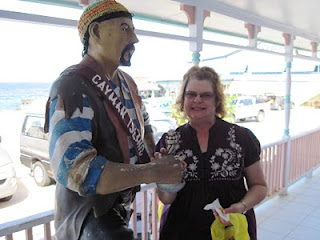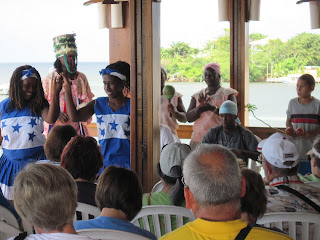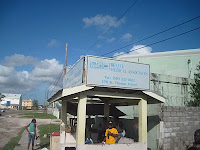
“Look at the faces of the people walking on the streets. How do they look? They are happy,” said tour guide Tony as our tour bus passed through Belize City.
Here, where some one-third of the islands population dwells, a group of tourist from Carnival Cruise Line’s Ledger had boarded for a guided five-and-half-hour trip inland and on to engage in a cave tubing adventure in the Belize River.
This is the “beautiful Caribbean Sea,” Tony noted as the driver maneuvered the bus along the water edge. This is the longest barrier reef in this hemisphere, he said, noting the shoreline and on to a barrier island covered with mangroves. To add to the sea’s beauty, this reef is the home of the Great Blue Hole, which is homed in the famed “Lighthouse Reef System” that lies some sixty miles off the city’s shores.(A sought-after place for scuba divers).
Tony stood near the driver and talked about the country’s landscapes, people and history. Though English is the country’s official language and Tony speaks perfect English, he quickly confides that Creole is his native tongue. Here in the only in Central American country with British colonial heritage, Tony’s “Creole” bloodline is that of an African slave mother and a European slave owner, he noted. When he isn’t working, he speaks only Creole. To do otherwise would give your fellow Creole breed the idea that you think you are better than he, Tony revealed.
The highway around the city was constructed by building up the shoreline in the city for tour vans and buses as the city grew into a major tourist place. In the city, the two-lane highway sets between Caribbean waters with off-shore mangrove islands on one side and on the other priceless hotels—with the tallest building being five-stories— nightclubs, discos and other adult entertainment centers. In this “kings” affluent area, properties start at $150,000 while the average income for the native people is a mere $400 per month, Tony reveals. Eighty percent of the people here are poor, but none die of starvation, he said.

“Where is everybody?” Tony asked as the van maneuvered on through the exclusive area. Then he answered his own question: “Locked up sleeping!” Though, he said, “Belize people love to socialize, love to talk.”
Tony quickly pointed out that the people of Belize take care of one-another. The Internet provider gives its services in schools for children, as well as scholarships, he said. Most schools are headed by the Nazarene church or government affiliates, with students wearing uniforms and prayers being delivered four times each day. Belize offers equality to everybody, he confined, adding, “We have the best literacy in Central America and maybe the world. That is un-Belize-able, people.” And thanks to the United States and Canada, the country has some of the “best tap water in Central America”.
Tony doesn’t hesitate to show his humorous side. “We have seven traffic lights in the country. Six are working,” he said with a grin.
Traveling deeper into the city leaving major tourist shops behind, observers see homes of the poor. Housing is obviously third-world, with many structures having partial add-ons here-and-there. But the houses are “built with love,” Tony said. Their owners owe no mortgage. As an add-on is completed, it is paid for.
Leaving town, the van turned left alongside a grave yard. Tony pointed out that the head-stones all faced the East. Thus, according to the natives’ belief, “God would return to earth in the East.”
Nearing a small settlement on the Western Highway, Tony alerts us to be unalarmed, as we were about to stop at a “check-point”. More than searching for drugs, National Police officers sought for persons who might have been kidnapped for “human trafficking.” The human trafficking problems is worse than drugs, he revealed.

People had relocated to this area after Harricane Hattie destroyed much of the city. Rather than return to their torn dwellings, they started over here, naming the community Hattieville. The stop was quick, and moving on we saw pine trees, palms and sugarcane growing on flat grounds and the stand of Maya Mountains in the not-so-near distance.
After the informative bus ride our group, so named the “Shipp Shakers”, arrived at Caves Branch River Archaeological Reserve. Here we were provided with tubes and lighted head-gear for the rest of our adventure that included holding onto a rope while crossing the river and a forty-five-minute hike through a rainforest area. According to our river tubing guide, vegetation here had some time ago been destroyed. Since then however, a variety of trees have grown tall and tropical plants bare fruits and nuts. The amazing cave tubing in the “muddy” river through huge limestone archways and caves holding “untold stories of Maya rituals” was truly phenomenon. History shows that these dark cave areas were not a place joyfully visited be the Mayas, the guide said. This was a place to present human sacrifice and considered to be of the devil. Our tour guide stopped often to shine his lighted helmet on the bizarre limestone shapes dripping with water and unusual figures that had developed over thousands of years.

We only visited for a few hours in this beautiful region so our sight-seeing in Belize was limited. Our future trips planned to this beautiful country will include the Mayan Ruins, barrier reef snorkeling, and taking part in the lost world canopy tour.
Phil and I plan a trip to the Eastern Caribbean in a couple weeks. Please return to my blog to read about our adventure.

















































